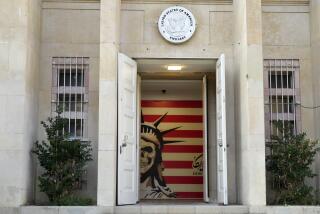U.S. diplomats study how to preserve Iran’s dignity in nuclear talks
JAKARTA, Indonesia — U.S. diplomats preparing for a new round of nuclear negotiations with Iran this week are pondering an important question: How can they make the Iranians feel like the winners?
The U.S. team and diplomats from five other nations sit down with Iran on Tuesday in Vienna to begin bargaining on what could be a historic agreement to prevent the Islamic Republic from gaining a bomb-making capability. An atmosphere of high anticipation surrounds the talks, which are expected to continue for six months to a year, and possibly longer.
But U.S. diplomats know that the deal will work only if ordinary Iranians believe it preserves the country’s dignity as it manacles their treasured nuclear program. They have been trying to shape a deal that will look like a victory for both sides.
President Obama has publicly acknowledged the importance of Iranian self-respect in the deal-making, saying any accord must provide a “dignified path for Iran to forge a new beginning with the wider world.”
In some key technical areas, it looks like there may be a path to compromise, say U.S. officials and experts. On other fundamental issues, it will be tough — one reason that Obama has put the odds of success at no better than 50%.
Since November, when the two sides signed an interim agreement that freezes some nuclear work while final bargaining is underway, there has been a war of words over what the deal will mean for Iran’s gleaming nuclear infrastructure.
With many Iranians considering the program the ultimate symbol of Persian accomplishment, Iranian officials have insisted that they will never dismantle any equipment.
But Iran’s insistence that it would not take apart any of its roughly 10,000 operating centrifuges — the machines that generate enriched uranium — could be sidestepped by an agreement to send some of the equipment to a third country for safekeeping, says Mark Fitzpatrick, a former State Department official with the International Institute for Strategic Studies in London.
The two sides have sharp differences over what to do about two nuclear plants: the deeply buried uranium enrichment plant at Fordow and a half-built heavy-water nuclear reactor at Arak, which Iran says it needs to generate isotopes for medical treatments.
Wendy Sherman, the chief U.S. negotiator, is arguing for a rollback in reasonable-sounding, face-saving terms. She says Iran can keep all the equipment it would need for a civil, or nonmilitary, program. That doesn’t include the Fordow or Arak plants.
Western countries insist that Fordow should be disabled because allowing work to continue at a bomb-resistant site could help Iran achieve a “breakout,” a race to create a bomb before the Western bombers could destroy the nuclear complex.
But a compromise might be found in converting the plant from uranium enrichment, the process that generates bomb fuel, to another, less sensitive nuclear activity, suggested Jofi Joseph, the former director for nonproliferation at the National Security Council. Such an arrangement would allow Iran to say the facility was still being used for nuclear work.
The West fears Iran’s goal with the Arak plant is to open an entire separate path to a bomb, through the use of plutonium fuel.
Arak is a worry to the West because heavy water is used in the process, and large amounts of weapons-grade plutonium could be extracted from an accompanying reprocessing plant, Joseph wrote this month.
This means that a compromise might be possible that would substitute a light-water nuclear reactor for the heavy-water reactor or limit the power capacity of the plant, says Joseph, who is with the Harvard Kennedy School’s Belfer Center for Science and International Affairs.
“Creative solutions can be devised to address the equities of both sides,” he wrote.
On other issues, though, it may be impossible to find middle ground.
The West wants sanctions relief to remain limited and easily reversible in the early years of the deal, to make sure Iran doesn’t start breaking the rules. The Iranians say they can’t accept that, because without large-scale and permanent sanctions relief they can’t entice foreign business to help revive Iran’s ailing economy — which they consider the whole aim of the deal.
Battling for permanent repeal of U.S. sanctions, as Iran will demand, could be impossible, because Congress is a stronghold of anti-Iran sentiment.
And there is likely to be an ugly fight over how long the “permanent” deal will last. U.S. officials would like it to be in place 20 to 25 years, in part because of their hope that, by the time curbs are lifted, a more moderate government will be in power. Though current President Hassan Rouhani is considered relatively moderate, he still follows the lead of fundamentalist supreme leader Ayatollah Ali Khamenei.
But a longer-range pact is unacceptable to Iranians for reasons of pride: They insist on being treated like a normal country, not an international pariah. They’re talking about a three- to five-year deal.
U.S. officials, eager to make Iranians feel good about a deal, are dangling the idea that it could help the isolated country regain a respected place among great powers — an idea that may unsettle Iran’s rivals in Israel and Saudi Arabia.
State Department planning director Jacob Sullivan, who took part in secret negotiations with Iran last year, recently told the New America Foundation that the deal will show that if Iran takes “concrete actions … people’s aspirations to be a proud, responsible nation with a seat at the table can be fulfilled.”
More to Read
Start your day right
Sign up for Essential California for news, features and recommendations from the L.A. Times and beyond in your inbox six days a week.
You may occasionally receive promotional content from the Los Angeles Times.







